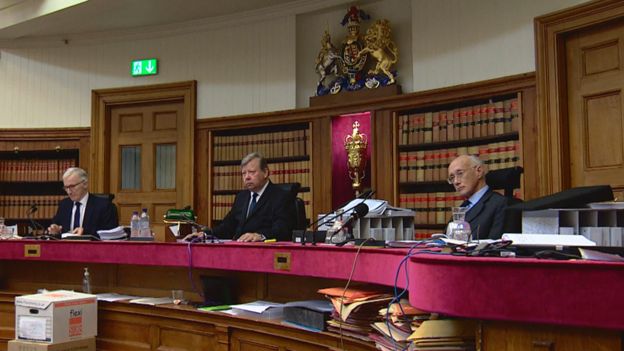Scottish judges rule Parliament suspension is unlawful
Boris Johnson’s suspension of the UK Parliament is unlawful, Scotland’s highest civil court has ruled.
A panel of three judges at the Court of Session found in favour of a cross-party group of politicians who were challenging the prime minister’s move.
The decision overturns an earlier ruling from the court, which said last week Mr Johnson had not broken the law.
But it will not immediately affect the current suspension of Parliament, which started in the early hours of Tuesday.
This is because no order has been given by the court to cancel the suspension ahead of a full hearing at the Supreme Court in London which starts on Tuesday of next week.
In a summary of their findings, the Court of Session judges said they were unanimous in their belief that Mr Johnson’s decision to suspend was motivated by the “improper purpose of stymying Parliament”.
They added: “The Court will accordingly make an Order declaring that the Prime Minister’s advice to HM the Queen and the prorogation which followed thereon was unlawful and is thus null and of no effect.”
Their full judgment will be released on Friday.
MPs are not currently due to return to Parliament until 14 October, when there will be a Queen’s Speech outlining Mr Johnson’s legislative plans. The UK is due to leave the EU on 31 October.
The group of 75 largely pro-Remain MPs and peers behind the legal challenge are headed by SNP MP Joanne Cherry, who has called for Parliament to be immediately reconvened following the ruling.

They appealed to the Inner House of the Court of Session after their original challenge to the suspension of Parliament was dismissed by judge Lord Doherty last week.
Lord Doherty said Mr Johnson had not broken the law by proroguing Parliament, and that it was for MPs and the electorate to judge the prime minister’s actions rather than the courts.
But the three Inner House judges said they disagreed with Lord Doherty’s ruling because this particular prorogation had been a “tactic to frustrate Parliament”.
One of the three judges, Lord Brodie, said: “This was an egregious case of a clear failure to comply with generally accepted standards of behaviour of public authorities.
“It was to be inferred that the principal reasons for the prorogation were to prevent or impede Parliament holding the executive to account and legislating with regard to Brexit, and to allow the executive to pursue a policy of a no-deal Brexit without further Parliamentary interference.”
And Lord Drummond Young said that the UK government had failed to show a valid reason for the prorogation, adding: “The circumstances, particularly the length of the prorogation, showed that the purpose was to prevent such scrutiny.
“The only inference that could be drawn was that the UK government and the prime minister wished to restrict Parliament.”
A spokesman for Number 10 said was “disappointed” by the decision, and will appeal to the Supreme Court.
He added: “The UK government needs to bring forward a strong domestic legislative agenda. Proroguing Parliament is the legal and necessary way of delivering this.”



